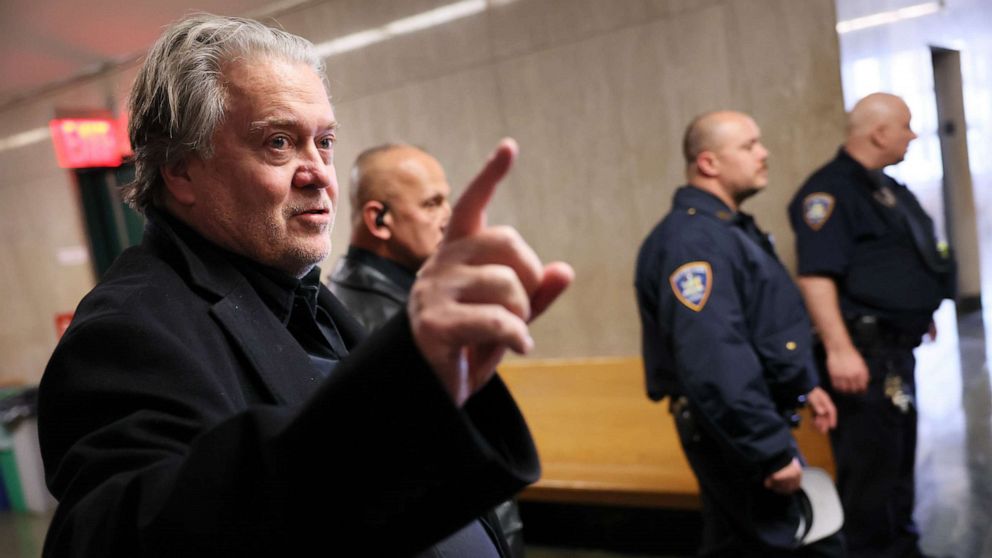as it is approaching election time, am wondering what, if anything, is happening to Bannon, Steve
perhaps rails getting greased so that the road becomes smoother
agnostic, naturally, even as situation acceleration, relatively, to hypersonic
abcnews.go.com
Judge on Steve Bannon trial: 'We can't keep dragging this out'
ABC News
Steve Bannon, a former adviser to Donald Trump, appeared in court Tuesday with a new crop of lawyers who promptly decried the "explosion" of evidence disclosures from the Manhattan District Attorney's Office and asked for additional time to review them.
"Now we have 32 terabytes of discovery," defense attorney Harlan Protass said. "We, like prior counsel, need time to get our hands around that discovery before we are able to set a motion schedule."
Bannon, who appeared in a black jacket over a black untucked button down, is charged with defrauding donors to We Build the Wall, an online fundraising mechanism for former President Trump's signature domestic project.

Steve Bannon, former adviser to President Donald Trump, points as he speaks after leaving a court appearance at NYS Supreme Court on Feb. 28, 2023, in New York City.
Michael M. Santiago/Getty Images
Bannon hired new lawyers after his prior counsel, David Schoen and John Mitchell, withdrew, citing "a complete breakdown in communication" with their client. The new attorneys sought a 90-day delay.
"All of us at this table are experienced at doing complicated cases," defense attorney John F. Carman said. "We have to, in some general sense, get our arms around what we're talking about."
The judge granted a 90-day reprieve and ordered Bannon to return to court May 25, citing a need to "move the case along" after Bannon's arraignment five months ago.
"Other than discovery being turned over, nothing has happened. Part of that is of Mr. Bannon's own doing," Judge Juan Merchan said. "We can't just keep dragging this out."
The judge, however, chided prosecutors over the true volume of discovery and the pace of its disclosure to the defense.
"What is the number really the defense is dealing with?" Merchan asked.
Assistant District Attorney Daniel Passeser struggled to explain the varying sources of evidence and size of the files.
"I don't think it's for you to decide what's important or relevant for the defense to look at," Merchan said.
In another potential shakeup in the case, the attorney for We Build the Wall asked to resign from the case, arguing the entity no longer functions or employs anyone.
"The human beings associated with We Build the Wall have all resigned," defense attorney Justin Weddle said. "There will be no people with whom I can communicate."
Prosecutors objected.
"We only found out about this 10 minutes ago," Passeser said.
Merchan declined to immediately grant the motion and ordered Weddle to return to court March 16.
In the meantime, a coincidence, doubtless
abc7.com
FBI investigates fire where Chinese billionaire, a Steve Bannon ally, was arrested
wsj.com
A Chinese Businessman’s Trek From Beijing Gadfly to Steve Bannon Confidant to Fraud Suspect
Prosecutors say Guo Wengui diverted investor money to buy a yacht, Ferrari and $36,000 mattress
By Aruna ViswanathaFollow
, James FanelliFollow
and Sha HuaFollow
Updated March 15, 2023 at 6:35 pm ET

Mr. Guo took advantage of the hundreds of thousands of followers he amassed online, prosecutors alleged, by soliciting investments in his cryptocurrency, media and other companies. Instead, he used the money to buy a $26 million home in New Jersey, a yacht, a Ferrari and a $36,000 mattress, among other items, said the indictment, which charged Mr. Guo with 11 counts of fraud and money laundering. Prosecutors said they seized $634 million in criminal proceeds and assets that included a Lamborghini.
Mr. Guo pleaded not guilty at his arraignment in court on Wednesday afternoon and consented to his detention in a federal jail but is expected to make a bail application for his release at a later date. A lawyer for Mr. Guo declined to comment. Mr. Guo said on his official social-media account on Wednesday morning that Federal Bureau of Investigation agents had raided his home at roughly 5 a.m. Hours later the New York City Fire Department responded to a fire inside his home, a New York City official said. Fire marshals were investigating the cause of the blaze, the official said.
Mr. Guo’s prosecution, if successful, might ease an irritant in U.S.-China relations, which have been increasingly tense as the nations jockey for economic and military advantages.
Prosecutors asked for Mr. Guo to be detained immediately, arguing he posed a flight risk. Known for his ostentatious habits, Mr. Guo often traveled with an entourage that included armed security guards. He has fought dozens of court battles, suing parties as diverse as former business partners, unknown students in the U.S. who criticized him on social media, and Dow Jones & Co. and Wall Street Journal reporters who wrote about him. A New York state court dismissed the lawsuit filed by Mr. Guo against Dow Jones and the Journal reporters. He often rallied his followers to personally harass his opponents and brand them as Chinese Communist Party spies.
Mr. Guo, who built a real estate empire in China, has said he fled from there in 2014 after hearing that a state security official to whom he was close would soon be arrested. He settled into a $67.5 million apartment overlooking Central Park, applied for asylum in the U.S. and began captivating some politically minded Chinese citizens with a barrage of tweets, online videos and social-media postsalleging corrupt links between China’s political and corporate elites.
Beijing has branded Mr. Guo as an attention-seeking criminal, accusing him of bribery, kidnapping, fraud and other allegations, which Mr. Guo has denied. He countered with a $150 million war chest that he said he would use to advance a vocal campaign against the Communist Party and fight Beijing’s attempts to discredit him.

Prosecutors say Guo Wengui used fraudulently obtained funds to pay for this yacht.
Photo: Justice Department
Mr. Guo used the social-media platform Discord to communicate with his followers and investors. Members in those chat groups interviewed by the Journal likened the atmosphere in those chats to “a cult.” Members were ranked according to their closeness to Mr. Guo, and privileges—such as access to secret chat groups—were bestowed on those who proved their fealty and loyalty, they said.
Since 2017, his presence in the U.S. has prompted multiple international diplomatic incidents. That year, Chinese security agents tried to pressure him to return to China, prompting a confrontation with FBI agents and an airport standoff at which Chinese agents were nearly arrested. Also that year, Chinese officials tried to extract Mr. Guo from the U.S. through a convoluted lobbying campaign that included casino mogul Steve Wynn, former Fugees rapper Pras Michel, Republican financier Elliott Broidy, and others. Mr. Michel, who has denied wrongdoing, is scheduled to face trial later this month on criminal charges related to the effort.
Mr. Guo later joined forces with Mr. Bannon, an adviser to former President Donald Trump, as tough critics of China’s Communist Party, and launched a media company, GTV Media Group, that raised more than $300 million in a private offering in 2020, sparking a federal investigation. Soon after the fundraising, some investors began pushing for refunds after they said they never received official documentation verifying their investments in GTV Media, The Wall Street Journal reported at the time.

Guo Wengui joined former Trump adviser Steve Bannon at a New York City event in 2018.Photo: don emmert/Agence France-Presse/Getty Images
As U.S.-China relations soured during the Trump administration, Mr. Guo emerged as a divisive figure among U.S. critics of China. Some, such as Mr. Bannon aligned themselves with Mr. Guo, while others said they distrusted him. At one point, the FBI viewed Mr. Guo as a potential agency informant and tried unsuccessfully to cultivate him as one, the Journal previously reported. Some of Mr. Guo’s associates also openly questioned Mr. Guo’s loyalty to the U.S.
In 2020, Mr. Bannon was arrested on Mr. Guo’s yacht, the Lady May, off the coast of Connecticut, and accused of fraud offenses for a border-wall scheme unrelated to Mr. Guo. He pleaded not guilty, and Mr. Trump pardoned him before leaving office. A lawyer for Mr. Bannon didn’t respond to a request for comment.
Details from the new case add to the intrigue surrounding Mr. Guo. Prosecutors disclosed, for example, that, when the FBI searched his penthouse in 2019 in a separate investigation of Mr. Guo, they recovered about 96 cellphones, roughly half of which were located inside signal-blocking Faraday bags in safes.
In 2021, GTV Media and two other companies tied to Mr. Guo agreed to pay $539 million to settle regulatory claims they violated investor-protection laws when they raised money from more than 5,000 investors. Since then, prosecutors said in a filing arguing for Mr. Guo’s detention, Mr. Guo “doubled down, adapted his techniques, and continued to rob thousands.” Last year, Mr. Guo even tried to get his defrauded investors, who were being repaid through the regulatory settlement, to invest in his new offerings again, prosecutors said. His asylum application remains pending, the filing said.
The new indictment, which is dated March 6 but was unsealed Wednesday, includes more details about the GTV allegations. In the case, prosecutors also charged William Je, a longtime associate of Mr. Guo’s. Both face a new parallel civil fraud lawsuit from the Securities and Exchange Commission. A lawyer for Mr. Je declined to comment.
In 2020, days after GTV sold $452 million in stock, Messrs. Guo and Je worked with others to misappropriate $100 million to place with a high-risk hedge fund, the indictment alleged. Mr. Guo then raised a further $150 million through a purported farm program that was focused on promoting democratic reforms in China, and hundreds of millions of dollars through purported “G-Club” memberships, the indictment said. Some of those funds were used to maintain the roughly 150-foot Lady May yacht, buy a $4.4 million custom-built Bugatti, the New Jersey mansion and other items.

An indictment says funds raised by Guo Wengui were used to buy a $4.4 million Bugatti.Photo: JUSTICE Department
In September and October of last year, U.S. authorities seized $335 million in bank accounts connected to a purported cryptocurrency company Mr. Guo promoted.
In recent years, Mr. Guo has dabbled in music and fashion. Mr. Guo released in 2020 a song called “ Take Down the CCP,” and followed up with a music video that showed him puffing cigars or riding what appears to be the now-seized Lamborghini. On the website of his G-fashion line, woolen caps were offered for $715 and cotton zip polos for $1,265.
Mr. Guo filed for personal bankruptcy in 2022 after a New York judge ordered him to pay $134 million in fines for having moved the Lady May out of state in violation of a court order.
Mr. Guo’s largest liability was an unpaid $254 million loan from Pacific Alliance Asia Opportunity Fund LP, which had been trying to gain control of his assets after receiving a judgment in the lender’s favor. When issuing the $134 million fine, Justice Barry R. Ostrager of the Supreme Court of New York said Mr. Guo had “secreted his assets in a maze of corporate entities and with family members.”
Mr. Guo later asked for his bankruptcy case to be dismissed, saying that he couldn’t afford the mounting costs of using chapter 11 to fight litigation from Pacific Alliance. However, the bankruptcy judge appointed a chapter 11 trustee instead, tasking that trustee with finding additional assets held by Mr. Guo.

New York City firefighters respond to a fire inside the Sherry-Netherland Hotel apartment of Guo Wengui, hours after his arrest.Photo: MIKE SEGAR/REUTERS
Teng Biao, a 49-year-old Chinese human-rights activist, Guo critic and visiting professor at the University of Chicago, said as many as 20 of Mr. Guo’s followers would stand in front of his home in New Jersey this and last winter, shout slogans and distribute fliers, accusing him of being a “CCP spy.”
“Justice delayed is better than justice denied,” said Mr. Teng on Wednesday about the news of Mr. Guo’s arrest. Mr. Teng said Mr. Guo had escaped prosecution in China thanks to the protection of powerful patrons. “He thought he could get away with the same thing here in the U.S.,” he added, “but the U.S. is governed by the rule of law.”
—James T. Areddy, Corinne Ramey and Alexander Gladstone contributed to this article.
Write to Aruna Viswanatha at aruna.viswanatha@wsj.com, James Fanelli at james.fanelli@wsj.com and Sha Hua at sha.hua@wsj.com
|




